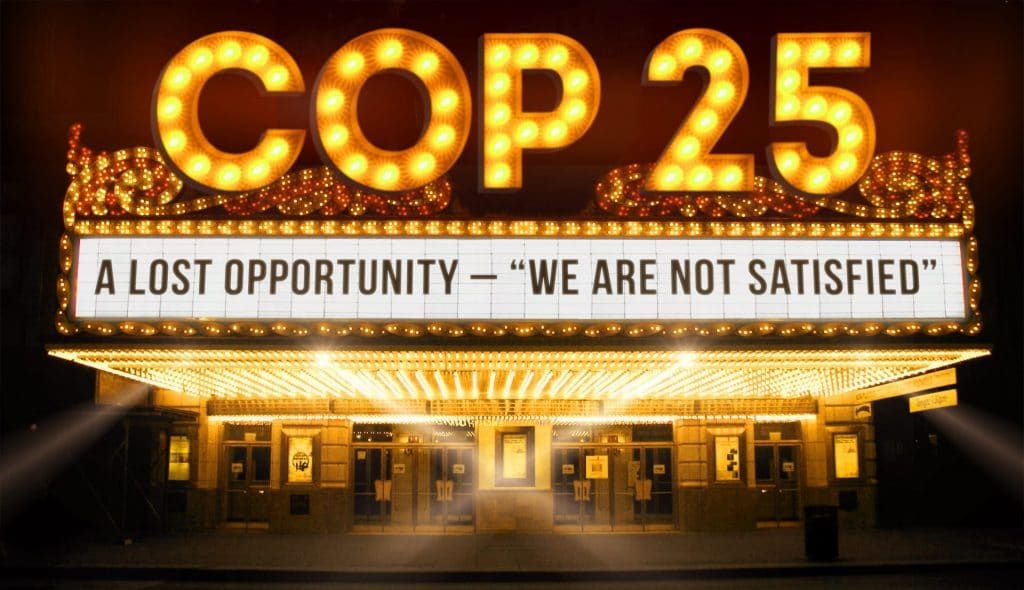COP25 climate change meeting gets global thumbs down
By Thomas Gaulkin | December 16, 2019

The reviews are in: The United Nations’ COP25 climate conference was a flop. If the two weeks of talks were a holiday movie, it would probably be pulled from theaters before Christmas.
DISAPPOINTMENT AS MARATHON CLIMATE TALKS END
…major polluters resisted calls for ramping up efforts to keep global warming at bay and negotiators postponed debate about rules for international carbon markets for another year… (AP)
A ‘LOST’ OPPORTUNITY
…widely denounced as one of the worst outcomes in a quarter-century of climate negotiations… (New York Times)
HARD FEELINGS, FEW RESULTS AND NEW DOUBTS ABOUT GLOBAL UNITY
“We are not satisfied,” said the conference chair, Chilean Environment Minister Carolina Schmidt. (Washington Post)
I am disappointed with the results of #COP25.
The international community lost an important opportunity to show increased ambition on mitigation, adaptation & finance to tackle the climate crisis.
But we must not give up, and I will not give up.
— António Guterres (@antonioguterres) December 15, 2019
The unimpressive showing began December 2 with nearly 200 countries and regional groups meeting on key efforts to combat greenhouse gas emissions, like defining global carbon markets, financial support for developing states most affected by climate change, and setting more ambitious CO2 reduction targets.
But none of those efforts panned out. Despite thousands of hours of negotiation, resistance from high-emissions countries like the United States (which is on track to be out of the Paris Agreement by the time COP26 convenes in Glasgow next November) helped scuttle other participants’ plans. In the end, the strongest agreement that emerged was that these same issues should be taken up at future meetings, and that there is an “urgent need” to get national commitments in line with the goals set in the Paris Agreement—not exactly breaking news.
Displaying a mastery of diplomatic understatement, the chair of the African Group of Negotiators, Mohamed Nasr, took stock: “This is becoming very worrying for some countries.”
MADRID CLIMATE CONFERENCE ENDS IN FAILURE
…The talking was endless: more than 70,000 hours were spent failing to define a “market instrument,” something that was meant to have been decided at last year’s conference in Katowice, Poland… (Real Clear Energy)
MAJOR STATES SNUB CALLS FOR CLIMATE ACTION
“There are millions of people all around the world who are already suffering from the impacts of climate change,” Ian Fry, Tuvalu’s representative, told delegates. “Denying this fact could be interpreted by some to be a crime against humanity.” (NYTimes)
WAS ANYTHING ACHIEVED?
“…The can-do spirit that birthed the Paris agreement feels like a distant memory today…” (The Guardian)
So was there anything to feel good about after two weeks of failure?
Well, if you were a fossil fuel company, you might have thought it was a success. One observer described the event as a “corporate trade show.” “A gantlet of greenwashing ads on the walkway from the metro,” wrote Taylor Billings for the climate newsletter Heated. “Huge billboards featuring the likes of gas-giant Iberdrola, global water privatizing giant Suez, and energy utility Endesa, Spain’s biggest polluter. They’re all sponsors of this years’ COP.”
The lack of progress on pricing carbon was also considered a positive result by those who worried a bad agreement would have been worse than none at all. “Thankfully the weak rules on a market based mechanism, promoted by Brazil and Australia, that would have undermined efforts to reduce emissions has been shelved and the fight on that can continue next year at COP26 in Glasgow,” said Mohamed Adow, with the group Power Shift Africa.
And despite the deep frustrations expressed by climate activists like Greta Thunberg, demonstrators found ways to make their opinions known about the disappointing proceedings and still come away with some kind of optimism…
"Protesters dump manure outside COP25 climate summit in Madrid #NewsVideo #BreakingNews #Youtube #GlobalNews #CBSN #FoxNews #ABCNews #NBCNews #CNN" : https://t.co/7lR6WOc5KX
— Global News Report (@robinsnewswire) December 14, 2019
Together, we make the world safer.
The Bulletin elevates expert voices above the noise. But as an independent nonprofit organization, our operations depend on the support of readers like you. Help us continue to deliver quality journalism that holds leaders accountable. Your support of our work at any level is important. In return, we promise our coverage will be understandable, influential, vigilant, solution-oriented, and fair-minded. Together we can make a difference.
Topics: Climate Change















